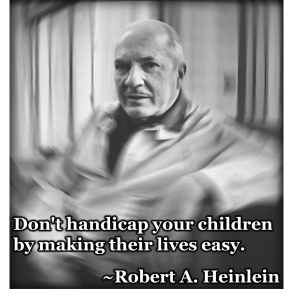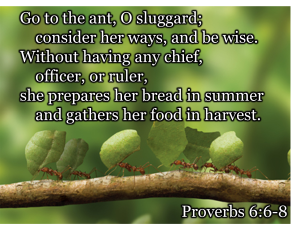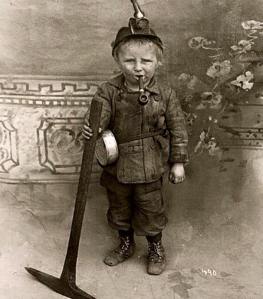The English word “spoil” is ultimately derived from the Latin word spoliare and comes down to English via the Old French word espillier. What is interesting about all the different forms of the word throughout history is that one common theme emerges: violence. “Spoil” as a verb referred “to stripping someone (usually an enemy) of clothes; to strip, plunder, pillage.” As a noun, “spoil” referred to the results of what was taken by this act of violence.
Why do I begin here? Today we most commonly apply the word “spoil” to two categories: food and children. What is interesting to observe is that these two categories “spoil” in opposite ways: food by neglect, children by indulgence. When we ignore and “under-care” for food, it spoils. Contrariwise, when we mollycoddle and “over-care” for children, they spoil.
But what does it mean to “over-care” for or pamper a child and why does this lead to spoilage? The answer rests in the nature of growth. We might, to continue the analogy, spoil food before it reaches maturity in a similar way. We might over-water it, over-feed it, over-expose it to sunlight, and so on. If we are poor gardeners we might lavish a plant with things that it legitimately needs to grow, but given to excess, kills it. We might even do this out of love. That is, we so love our green beans that we lavishly spread manure over them, but give them so much that we suffocate them. No one who did this to plants could be said “to love” his green beans; so too with children. Both plants and children need the right amount of nutrients to grow, but no more. Both plants and children must be worked on to grow—they must be weeded, they must be pruned. They must be cultivated, which might include activities that each find disagreeable.
It is quite understandable that parents would want to protect their child. But when that protection is aimed at the elimination of all suffering, the parent—in a serious way—does violence to the child (i.e., spoils the child). We live at a time when people view childhood as a time set aside for delight, for play, for the care-free life spent skipping amongst the daisies, and splashing in pools. We must not, so the thinking goes, impose upon the child discipline and training and force the child to “grow up too fast.” Children must not be made to suffer these things. We must not spoil their childhood.
It is certainly understandable why some parents have this point of view. When we’re children, all we want to do is grow up, right? We want to be older. We want to do what the grown-ups do. We want to sit at the grown-up’s table. Who likes to sit at the “kids table?” Yet, once we grow up, we find that it’s not all it promised to be. There are debts to pay, yards to mow, laundry to wash, meals to cook, careers to advance, spouses to please, neighbors to keep up with. And faced with such undesirable circumstances, we tell our children, “Gather Ye Rosebuds While Ye May.” So, we want to protect our children from all this. Perhaps we don’t want them to grow up, because we don’t like what growing up looks like. So, we give our children everything they want to protect them from all these undesirables.
No one, however, who thinks this way about their children, can be said to love their children. For this approach merely keeps the child as a child, which is unnatural. The child’s desire to “grow up” is natural and must be nurtured, not impeded. To lavish the child with everything he or she wants is to keep the child in a state of perpetual youth. Is this not what we mean by a “spoiled brat?” And when the child is given everything he wants, he cultivates within the mindset of “I will do what I will do, and no one will tell me otherwise.” This seems to have become the mantra of a large portion of our culture, and it is the mantra of perpetual childhood. It is the mantra of a wealthy era. For only the child expects to get whatever they want, do whatever they, and say whatever they want without consequences. This is the false process of a shallow freedom defined only as “lack of restraint.”
But true freedom is the ability to live according to one’s nature: to be able to live and act without a ruler and an overseer. But this requires great training, great discipline, great pain. The parents who truly love their children would be willing to see their children suffer so that those children might grow into healthy adults.
In our culture we often consider struggle as a sign that there is a problem. When a student is “struggling” with his or her homework, either the homework is too difficult or there is something wrong with the student—a learning disability perhaps. But why make this assumption? When I see a student struggling to understand, I rejoice. To me, this is a sign not that there is a problem, but that the student is thinking. Muscles must strain to grow. Iron must be hammered to be shaped. Friction must be achieved to sand wood. The mind must struggle with things it does not understand in order to come to an understanding. What really worries me are the students who aren’t struggling, because this is a sign either that the student already does understand (and so what is the point of the lesson) or that the student is indifferent and so no learning occurs.
Of course, we must do the right exercises too. Anyone who works in fitness and health will tell you that much damage can be done when exercises are done improperly. And much of what goes on in modern education would count as “damaging exercises.” But that’s not exactly my topic at the present. What is of more concern here is that we often find educators and even adults, avoiding tasks because they are “difficult.” For example, so many adults I meet refuse to read Shakespeare because it is “over their heads.” To this, philosopher Mortimer J. Adler answers:
Whoever passes by what is over his head condemns his head to its present low altitude; for nothing can elevate a mind except what is over its head; and that elevation is not accomplished by capillary attraction, but only by the hard work of climbing up the ropes, with sore hands and aching muscles.
We mustn’t give our children “what they can handle.” We must give them “more than they can handle” so that they can grow ever stronger and stronger. Adults who refuse to grow can never, without the charge of hypocrisy, expect children to grow.
We must be stronger than our children. We must be strong enough to say “no” to their desires because they are not yet strong enough. But to do this, we must be strong enough to say “no” to our own desires. And perhaps, as the Bard said, “there’s the rub.” Perhaps we give our children all they want because we ourselves are still children. Perhaps we are not yet strong enough to rule ourselves. Perhaps we are not willing to be exact and demanding with ourselves, so we cannot do so with our children.
So, will we? Will we ourselves “grow up” and stop spoiling ourselves and our children? Are we willing to see ourselves suffer and our children suffer that we might be something greater than we are now? Or will we continue to indulge ourselves like children and remain in a state of perpetual immaturity demanding to have the world bend to our wills?
And by “suffer,” of course, I do not mean “abuse.” Clearly, that would go against all that I’ve stated here. Certainly there is an opposite error that some parents have made whereby they use abuse and punishment for the “good of the child.” Certainly not all discipline, training, and punishment is up-building; but neither is all discipline, training, and punishment harmful. As I’ve argued here, it can, in fact, be quite loving. Where is the line? Let that be the topic for another post.
For now, let us focus on not spoiling our children, on not plundering and pillaging them by lavishing them with all they want. Let us discipline them and help them grow. Let us cultivate them into the adults they are intended to be.


